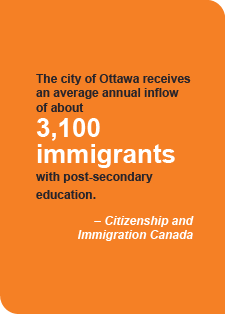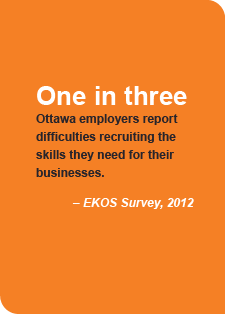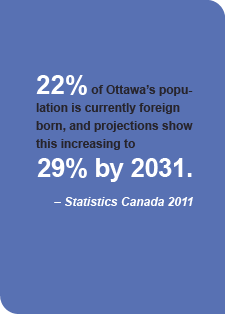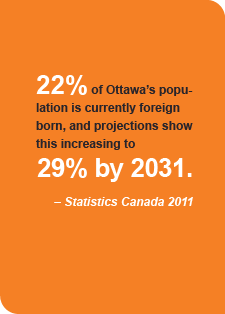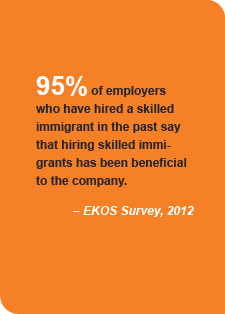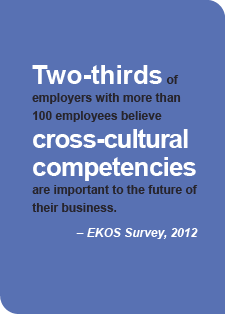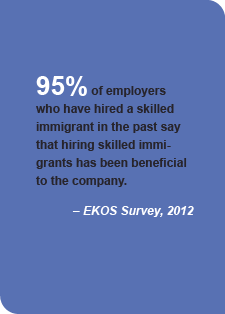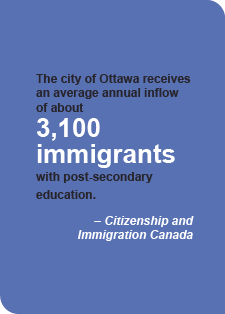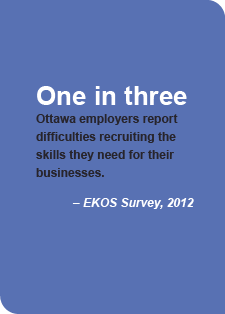Internships in Ontario: A checklist for employers
Internships are playing a growing role in the skills development and integration of our city’s labour market entrants. These experiences offer advantages to job-seekers as well as host- organizations, presenting an excellent opportunity for highly skilled newcomers to gain familiarity with the Canadian workplace culture, and strengthening host-organization mentoring culture and training programs, while bolstering the talent pipeline.
In human resources lingo, internships tend to be loosely classified as ‘formal,’ ‘informal,’ ‘paid,’ and ‘unpaid’. Organizations can sometimes be perplexed when it comes to understanding their responsibilities when entering into an internship relationship, especially with regards to compensation.
I was recently approached by Hire Immigrants Ottawa to clarify some of the regulations which govern organizations as they plan an internship for newcomers to Canada, as well as what factors can contribute to a successful experience for both parties.
Here are some of the basics, and some resources to consult for more information.
Most employment relationships in Ontario are regulated by the Employment Standards Act, 2000 (ESA). Under this legislation, an internship is considered a paid employment relationship and entitles the intern to minimum wage payments unless all six of the following conditions are met:
1) The training is similar to that which is given in a vocational school.
This requirement indicates that in order for an intern not to be considered an employee, they must be learning employable skills or a caliber comparable to vocational schools – extending beyond errands and small tasks.
2) The training is for the benefit of the individual.
3) The person providing the training derives little, if any, benefit from the activity of the individual while he or she is being trained.
Requirements two and three infer that an intern who is not receiving remuneration cannot perform work which would otherwise be paid. The intern must be taken for their own proper benefit and not for that of the employer.
4) The individual does not displace employees of the company providing the training.
The ‘unpaid’ intern cannot take the place of a current employee or act as a substitute for hiring a new employee.
5) The individual is not accorded a right to become an employee of the company providing the training.
This requirement outlines that the ‘unpaid’ internship may not automatically end with a guaranteed position. Hiring of interns may occur on a contingent basis dependent on assessment at the end of the internship program.
6) The individual is advised that he or she will receive no remuneration for the time that he or she spends in training.
It is important to note that although a newcomer may agree to partake in an unpaid internship program, they may still qualify as an employee for the purposes of the ESA, and therefore be entitled to remuneration.
While remuneration is the final item addressed on the list of requirements above, one of the first things a host-organization should determine and communicate to a potential intern is what training will be provided and whether/how they will be remunerated.
If your organization is considering taking an intern for the first time, I would advise you to have an internship agreement in place. This document should outline the objectives of the internship, the duties and responsibilities of both parties, and the organization’s HR policies with regards to privacy, confidentiality, intellectual property, and termination.
It is also essential to ensure compliance with the Workplace Safety and Insurance Act, as well as the Ontario Human Rights Code – two other pieces of legislation which have a bearing on employment in Ontario.
In 2009, HIO recognized Human Resources and Skills Development Canada (HRSDC) with an Employer Excellence Award for their paid Immigrant Internship Pilot Program (now called Federal Internship for Newcomers Program with Citizenship and Immigration Canada). Janice Charette, Deputy Minister of HRSDC at the time shared that, “This pilot has created an opportunity for HRSDC to recruit and mentor Foreign Trained Professionals, not only increasing the diversity of our workplace, but providing them with a quality work experience that will help them to better integrate into the workforce.”
If you are considering bringing a newcomer intern aboard, I would encourage you to get involved with HIO for cross-cultural training and referral to organizations in Ottawa that can help your organization source candidates.
George Vuicic is an Ottawa based partner with Hicks Morley LLP, a law firm specializing in human resources law and advocacy for employers. George thrives on helping employers to achieve their workplace objectives.

